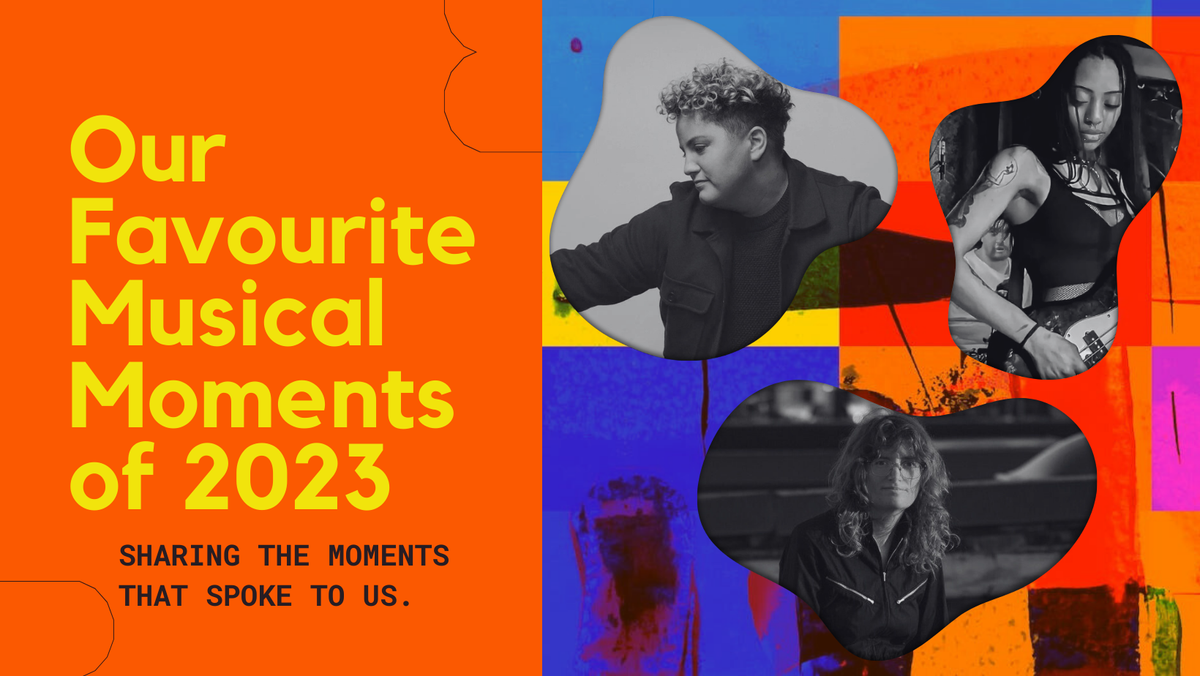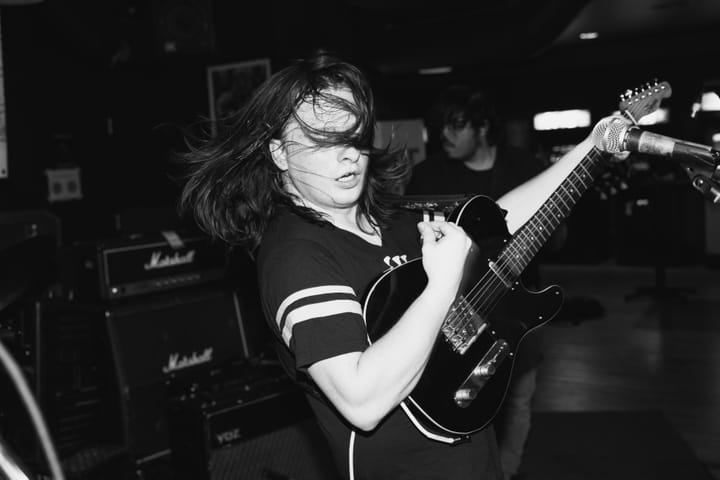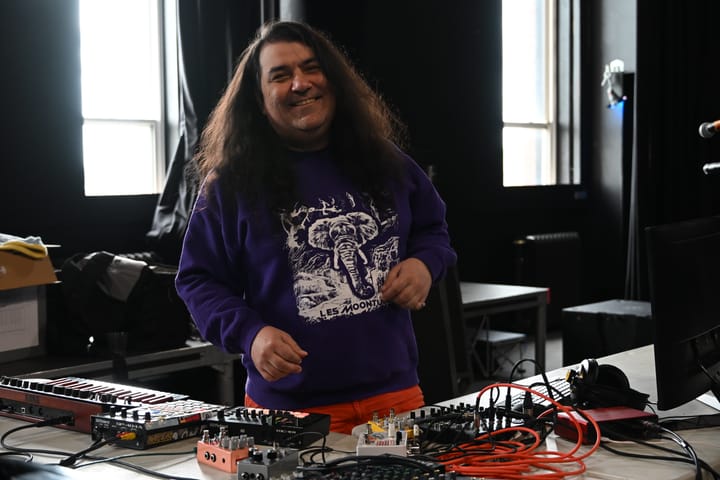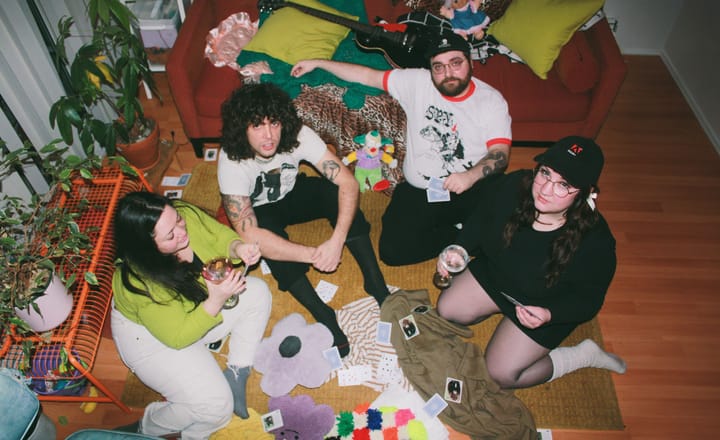
Our Favourite Musical Moments of 2023
The nice thing that comes with age is the growing capacity for self-reflection. Our third year was our biggest yet in terms of publishing, the amount of events we put on and co-presented, as well as finally getting to have our first-ever Annual General Meeting before our incorporation. Having three years under our belt also means we have a better sense of how we want to approach our craft as New Feeling, such as revisiting old themes (like we did with our Reviews issue), or developing ways to handle sensitive topics like addiction and mental health with care, as we did with Habit.
Last year we didn't do any kind of year-end recap. We're still trying to figure out how we want to approach looking back on the year without just thoughtlessly doing what everyone else does. The album release cycle is punishing, both to artists and those of us who are enthusiastic enough to write about their work. Solely focusing on albums removes a large swath of artists who are already under-represented in the press. Lists are hierarchical and amplify the feeling of competition that artists already have to contend with far too much... there's a lot to think about and navigate. This year, we wanted to embrace the reflective qualities of year-end lists, without being so prescriptive about what each writer chose to focus on, whether it was a live event, album, song, or whatever, so long as it spoke to them. Embracing the subjectivity of the format, here are our favourite musical moments of 2023!
Charlotte Cornfield - "Gentle Like The Drugs"
On “Gentle Like The Drugs,” Charlotte Cornfield is taking in her surroundings. Her tone is light and curious as she observes a sunset and a dust devil, never attaching too much weight to any one image. When she heads for the chorus, a playful bass lick comes in over the piano chords and kick-snare beat. “Surprise me / when I get home for the first time / I really don’t feel alone,” Cornfield sings, harmonies joining in. “Or anything sad / or anything profound / I just feel gentle like the drugs I do when you’re not around.”
In early summer, I found myself in Vancouver. My partner was doing some contract work out of a Vancouver office; I was looking for work and slightly losing it, coming down after finishing my MA. Giving up on job applications and pitching for the day, I decided to go for a walk in Stanley Park. I followed the path beside the seawall, turning in eventually towards the loping grass. I walked around a pond that reminded me of High Park in Toronto, where I grew up, and paused at a bench dedicated to “25 Years of Beauty—Vancouver Laser & Skin Care Centre.”
Wandering over to the Stanley Park Rose Garden, I put on “Gentle Like The Drugs.” Cornfield’s voice accompanied my aimless path, as blue sky mingled with clouds. Everything was an inviting green. I liked the fat and grooved tree trunks. I wished I had some pot.
In “Gentle Like The Drugs,” instead of some grand epiphany, Cornfield encounters the lilt of the familiar. This revelation arrives without drama, just a background organ, a shimmering guitar, and Cornfield’s casual vocal. The song is a perfect match of form and content, a tender ode to finding beauty in comfort. Those small revelations can be just as significant as anything else; they help us know where home is.
I sent my girlfriend a link to the song. We were getting ready to move in together in the fall, and I hoped it would feel like this.
— Rosie Long Decter
Festival Lingua Franca
My highlight of the year was the return of my passion project, Festival Lingua Franca, in a live music capacity this September. While I was unable to physically attend the events that weekend because of health related issues, I was able to watch the proceedings from a distance via Zoom.
Since 2017, the event has been a showcase of racially diverse bands and musicians of the “loud and noisy” variety who are frequently ignored by the musical establishment. In many ways, the fallout from the pandemic froze and even reversed some of the efforts that had been made toward creating a more diverse music scene; much work is still needed. That weekend, the greatest joy I had felt in years came from seeing the sheer jubilation expressed by the audience and performers whose diversity reflected each other.
— Daniel G. Wilson
Kellie Loder - "Sonny's Dream"
Some music has the ability to connect us to times and places we would not otherwise experience; some music speaks to us very directly, and right in the here and now. Sometimes, though rarely, music can do both at the same time, and Kellie Loder’s rendition of “Sonny’s dream” is a particularly potent example of this.
This song, about paradise and being trapped in it, is a heart-wrenching piece to begin with and Kellie Loder spares us nothing in their version of Ron Hynes’ classic.
Like Sonny in the song, Loder grew up in rural Newfoundland. The location’s imagery is drawn out so clearly both in the lyrics and the rendition. Unlike Sonny in the song, Loder has done everything to break free of confines throughout their career, and to reach out and help others do the same.
This past year, the world has seemed to go on a downward spiral— forcing me to think about my identity and how this relates to my place in it all in the world. If music can speak to us deeply while helping us imagine that which falls outside of the confines of our own existence, then it has potential to invoke real change.
— Sarah Chodos
Feist - Multitudes
We all know the power of music to move us – the way a melody, a lyric, a wash of sound can resonate so strongly that it feels like whoever wrote it somehow delved inside your own brain. In my two decades of interviewing artists, one common thread has always been the insistence that while they may have written the songs, it’s what the listener takes from that art that actually matters.
I’d already heard most of the songs from Feist’s Multitudes long before the album came out – largely because of the live residencies she did to develop the record – but when it was finally released in April, and in going to see the newer iterations of the show, I was reminded of how deeply her explorations of love, loss, death, grief, and change resonated.
In Multitudes, Feist swims through seemingly polar-opposite tides of aging: new motherhood and losing a parent. Not having gone through either experience, I still hear so much that rings painstakingly true about midlife: the impossibility of understanding how we’ll go on after those we love are gone; the startling realization that you no longer are the same person you were a decade (or two or three) ago – and the taking-stock that happens when you try to comprehend that evolution.
Both Multitudes, the album and its uniquely intimate tour, are a reminder of how music soundtracks our lives – even if those lives are very different from those of the artists whose work stirs something elemental deep inside.
— Tabassum Siddiqui
The Cure vs Ticketmaster
High goth royalty the Cure had one of the most insatiable/ravenous vampires of them all in their crosshairs back in March, embarking on a North American stadium tour, foregoing Ticketmaster’s dynamic pricing model and maintaining a non-transferable ticket policy wherever possible to deter scalper creep.
In theory, that implied tickets as low as $20 a seat for their shows. What followed became a case study in the barriers to increasing equity in a consolidated ticketing marketplace: fans arrived at checkout to discover service charges sometimes exceeding the costs of the tickets themselves. Days of highly publicized pressure from frontman Robert Smith led to further negotiations with the ticketing giant, with Ticketmaster finally heeling, issuing automatic refunds to the tour’s customers — $10 per ticket for the lowest ticket price transactions and $5 per for all remaining purchases.
The high-profile nature of the debacle reignited calls to break up Live Nation and Ticketmaster and prompted scrutiny of laws preventing bands from limiting ticket transferability for gigs.
— Tom Beedham
Read more

Sentries: Multifaceted Noise Rock

Step Into Little Stone Crow's World

